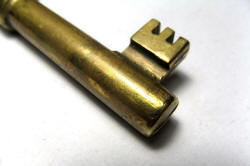Word class: the essentials
Generally, 10 classes of words are recognised in English. These
are sometimes called 'parts of speech'.
Take a piece of paper and see how many you can remember from school
and then click here.
Now ask yourself why these are divided into two groups.
When you have an answer, click for the answer.
Group A words are called
open-class items because in theory we
can keep adding more to the list indefinitely. Languages
consistently create new nouns, for example, to describe new events or
objects.
Group B words are closed-system items. We do not usually create
new prepositions (although we can) and introducing a new pronoun into
the language is extremely rare.
 |
Determiners: the missing class |
There is, in fact, a word class missing from this list which is
used in more modern grammars: determiners.
Determiners are words which modify nouns (just as adjectives,
demonstratives and articles do). In older grammars,
determiners were often classed as adjectives (we can have few
dogs and fewer dogs) or as demonstratives (these
books, that man) or as articles (the car, some sugar)
or even as pronouns.
This is not satisfactory in many ways so the modern term for words
such as each, all, more, the, a, several, these, either etc. when
they come before nouns is simply
determiner.
How determiners work in English is not a simple matter to analyse
and is the subject of
a separate guide.
Following that guide successfully will be quite difficult if the
area is new to you. You will almost certainly need to
understand issues of (un)countability in nouns before tackling it.
Now click for a test to
see if you can identify what these different word classes actually do in
the language. Don't worry if you don't get it all right.
It's explained below.
 |
Key characteristics of word classes |
 |
Nouns |
Apart from obvious (and slightly inaccurate) distinctions between abstract
nouns (beauty, hope etc.),
concrete nouns (apple, table etc.) and proper nouns (James, Canada etc.), there is a key distinction
learners (and you) need to understand:
countability
and uncountability.
Countable nouns can be preceded by a number (two cats), some
(some dogs) and a few. They usually take plural endings.
In the plural, we use a plural form of the verb with them (are
not is, for example).
Uncountable nouns are better referred to as mass nouns and
cannot be preceded by a number or a few (but can be preceded by
some) and only take plurals in unusual meanings when we make
them countable. We use the singular form of the verb with these.
Divide these
sugar, pea, furniture, happiness, sheep, army, money, attention, pliers, coffee, teacher, food, door, discomfort, information, luggage, suitcase, chair
and then click here for some comments.
It's not as easy as it looks, is it? There are two important things to understand.
- Some words (such as sugar and door) are clear cases of
uncountable and countable examples. Others are more complicated
because we can use them in both ways with different meanings.
Compare You have my attention (uncountable) with His
attentions are unwelcome (countable). Some nouns,
such as sheep are countable but take no plural.
Some obviously countable things, such as money, are
treated as uncountable in English.
Virtually all uncountable nouns can be made countable in English when we are using them to classify things. For example, There are some coffees which are too bitter for me, They have lots of German wines on the list etc. - Different languages deal with these things differently.
In German, for example, information is a countable
noun. In Greek, so is money. When introducing a
noun, remember that students will probably presume it's
countable unless you make it clear otherwise. So you'll
get people saying furnitures and it'll be your fault,
not theirs!
 |
Verbs |
There is another key distinction here. Can you divide this list into three groups? Think about how you use the words in a sentence.
smoke, give, go, enjoy, breathe, beat, come, arrive, listen, see, hear, feel, say, speak, think, carry, jump, reciprocate
Click here when you've done that.
| Used with an object | Used without an object | Used both ways |
| give enjoy beat feel say carry |
go come arrive listen think reciprocate |
smoke breathe see hear speak jump |
The issue here is called
transitivity. Transitive verbs take an object,
intransitive verbs don't but some verbs can do both.
We can say, I smoke and I smoked a cigarette.
We can say, She carried the box but not She
carried. We can say I arrived but not
I arrived / went / came the airport.
Sometimes, there's a change in meaning: He can hear
and He can hear it are different.
When you teach a new verb, bear in mind that languages deal
with transitivity differently. In some languages, for
example, you can say I jumped the table (meaning
onto, not over) or She
listened the music. Set verbs in a context and
make sure that your learners are aware of whether they are
transitive, intransitive or both.
 |
Conjunctions |
Here's another list to categorise. Conjunctions can
coordinate two clauses or they can
subordinate one clause to another
(making one clause depend on the other).
For example:
He makes the beds and he does the washing up is an example of
and working as a coordinating
conjunction. Both parts of the sentence are meaningful without the
other.
I won't make the beds unless you do the washing up is an
example of unless acting as a subordinating
conjunction. We can't understand the second clause without
reference to the first.
Here's the list to categorise.
but, after, although, as, and, as soon as, because, before, if, in order that, so, unless, until, when
Click here for the answer.
| Coordinating | Subordinating |
| but so and |
after although as as soon as because before if in order that so unless until when |
Notice that so appears in both columns. It can be
coordinating (as in He is a farmer, so is his brother) and
subordinating I did the washing up so you can make the beds.
There are many more subordinating conjunctions and they carry a range of
meanings: conditionality (if, unless), consequence (so),
reason (because), time (when, until) etc.
Once a learner is able to use coordinating conjunctions, it's time to
teach subordination.
There is a third type of conjunction
you need to know about: correlating (or correlative) conjunctions.
Here's the list:
both ... and, just as ...so, (n)either ... (n)or, whether ... or,
not only ... but (also)
Can you make an example using these? Note that this class of
conjunctions is confined pretty much to linking ideas inside sentences
rather then linking sentences together. Click
here for some
examples of them in use.
Both John and Mary are coming
Neither Fred nor I can open it
Either you do it now or you can wait until I have time
I don't know whether they are coming separately or together
The problem is not only important but (also) urgent
There is a more advanced guide to conjunctions on this site.
 |
Prepositions |
This a notoriously difficult area of English because there's seems
little rhyme or reason to which preposition we use where. The
other issue, as usual, is that languages differ. Some languages
don't use prepositions at all, preferring post-positions, so we
get The bridge along.
But there are some rules.
- Distinguish between movement and position:
- I went to the station (direction of movement)
- I arrived at the station (position)
- Distinguish between exact place and general place:
- He is in the station at the booking office
- He is in London at the station
- Distinguish between prepositions which describe absolute
position and those which describe things from the speaker's point of
view:
- The house is between two trees / the house is next to / near the cinema / the house is opposite the church (wherever you are standing)
- The house is behind the trees / the house is in front of the garage (from where you are standing)
There is a guide to prepositions on this site.
 |
Adjectives |
There is, of course, a separate essential guide
to adjectives so this will be brief.
Adjectives in English modify nouns (usually) to distinguish them in
some way and (usually) come in
one of two places:
- Before the noun they describe (attributive use):
- a fat cat, a huge house etc.
- After the noun they describe and linked to it by a verb such as be, look like, taste, smell, appear etc. (predicative use):
- The cat is fat, the house appeared huge etc.
 |
Articles |
Articles are a sub-class of determiners.
Again, there's
a
more advanced guide to articles on the site.
There are only three true articles in English: a, an and
the. The other choice in English is no article at all
and that is usually represented by a zero sign, like this: ∅.
The zero article is important because it is used in English to refer
to all instances of something.
(Some analyses will include some in the
list but it's actually not an article although it can work in a very
similar fashion.)
A few examples are all that's needed here:
a house,
a university,
an apple etc. (Note that the
choice of a or an is determined by the sound of the following word,
not the spelling.)
the house,
the man I met etc.
∅ people often complain,
∅ cars pollute etc.
The rules for deciding which article to use are not simple so go to the guide to articles for more detail. Essentially, the rule is:
Decide what you are talking about. There are only three choices:
-
One of many – indefinite specific reference (a house, a person, an idiot etc.)
-
All of them, everywhere – generic reference (∅ people, ∅ tigers, ∅ computers etc.)
-
This one exactly – definite specific reference (the woman on the corner, the train for ∅ London, the visitors to the park, the tourist industry etc.)
 |
Adverbs |
Adverbs are words which modify verbs just as adjectives modify
nouns. In many languages they are not distinguished from
adjectives but English is not like that.
There is an
essential guide to adverbs on this site so a few examples of
what is meant will do here:
He walked slowly and
carefully to the door
(answering how?)
He's is coming soon
(answering when?)
He sometimes tells tall stories
(answering how often?)
They wandered around
(answering where?)
etc.
 |
Pronouns |
Again, there are guides to pronouns on this site accessible from the initial plus training index.
Pronouns stand in for or replace nouns so instead of saying The
rain fell and the rain was heavy we can say The rain fell
and it was heavy. Essentially,
there are two sorts:
- Personal pronouns. For example:
- Mary didn't have a pen so I gave her mine (instead of Mary didn't have a pen so this person gave Mary the pen belonging to this person)
- Other pronouns. For example:
- Somebody is at the door
(instead of An unknown person is at the door)
Nothing is too much trouble (instead of No action is too much trouble)
He wanted money so I gave him some (instead of The male person wanted money so this person gave the male person some money)
 |
Demonstratives |
Demonstratives are a sub-class of determiners.
There are four of these in English (this, that, these, those)
and they refer to what we want to talk about. In other words,
they demonstrate or point out what we are referring
to. There are two decisions to make:
- Is it near or far?
- Use this or these for things near to you:
I want this one, I can give you these tickets
Use that or those for things further away:
Can I have that one? Take those tickets over there - Is it singular, uncountable or plural?
- Use this and that for singular or
uncountable nouns:
Give him that wine, I didn't ask for this meal
Use these and those for plural nouns:
Can I take these glasses? I haven't opened those bottles yet
Note that demonstratives can also act as pronouns:
I don't want these apples
(demonstrative), I want those
(pronoun).
 |
Interjections |
This is the simplest class of all. These words are not, in
a sense, 'real' words because they represent noises things and
people make. For example:
"Ouch!" he cried.
"Aaargh!
I've done it again."
"Pssst."
he said.
The car went 'clunkety-clunk' and
stopped
Click for a test of the key elements of word class.
